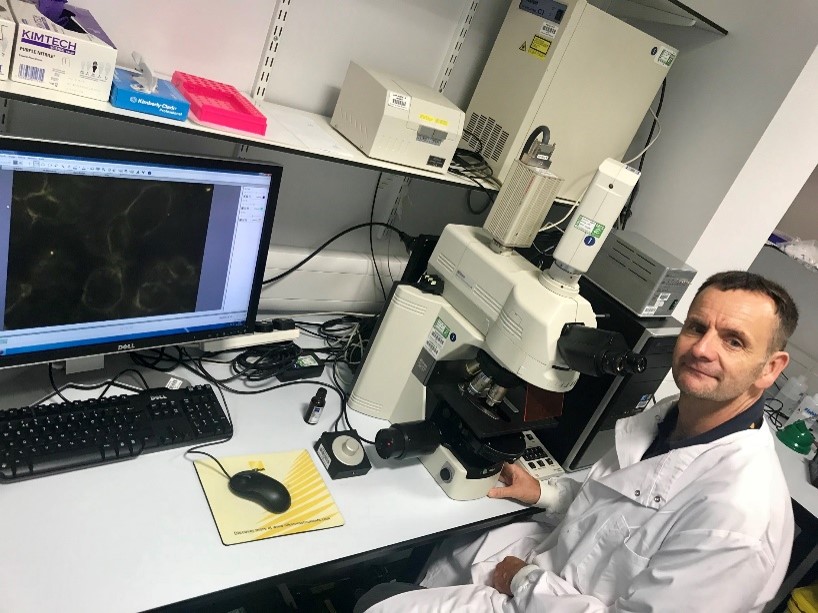New research on long-COVID offers hope for patients living with condition
A new clinical study from Cardiff Metropolitan University – in collaboration with Cwm Taf Morgannwg University Health Board (CTM UHB) – has highlighted new biomedical insights into long-COVID and could take existing studies one step closer to finding treatment for patients living with the condition.

Long COVID is a new condition which can affect people who have previously had the COVID-19 virus. Symptoms can include heart disease, muscle and joint pain, extreme tiredness, coughing, shortness of breath and memory difficulties.
The ‘Seasonal variation in the associations between self-reported long-COVID symptoms and IL-6 signaling-related factors’ clinical study from Cardiff Met and CTM UHB included DNA and blood samples taken from 175 participants who had previously had the COVID-19 infection. The bloods taken measured levels of two proteins, ‘Interleukin-6 (IL-6)’ and ‘Interleukin-6 Receptor (IL-6R)’, while the DNA sample was used to detect which variant of IL-6R gene, known as ‘IL-6R genotype’, was present.
IL-6 and IL-6R are made by the immune system to fight infection. IL-6R is the receptor that IL-6 attaches to - like a key fitting into a lock. This connection allows IL-6 to send signals that trigger an immune response.
Craig Greenstock, 63, from Pontypridd took part in the study and was first admitted to hospital in December 2020 at the height of the pandemic after being diagnosed with COVID Pneumonitis. He was previously fit and healthy.
Craig went on to spend the next nine weeks in hospital, initially placed on a ventilator within the intensive care unit at CTM UHB before being moved to various wards.
He has since been diagnosed with long COVID and suffers with bouts of fatigue, breathlessness, brain fog, PTSD, night terrors and is being treated with three daily pumps for asthma related symptoms. A nodule was also discovered on Craig’s lung following the infection.
Craig said: “I can safely say that when I was first admitted to hospital and what then developed was the scariest time of my life, both physically and mentally.
“I was extremely unwell for some time, with my family being given 24 hours for my condition to improve. My symptoms following the virus have been so significant it has resulted in me having to retire from work.”
Participants were also asked to complete a questionnaire sharing their current long COVID symptoms at different times throughout the year to see if the change in seasons affected the condition, and to help get an accurate diagnosis.
The purpose of the study - which was funded through The Cwm Taf Morgannwg University Health Board Collaborative Research Fund - was to better understand how these IL-6-related factors contribute to the risk of long COVID and possibly initiate future strategies for using them as biomarkers predictive of risk.
The results from the participants tested highlighted that long COVID sufferers had elevated levels of IL-6 compared to those who had regained full health. The results also showed the risk of getting long COVID appeared to be increased in patients with a particular type of IL-6R genotype, known as the ‘AA’ genotype.
Dr Richard Webb, a Principal Lecturer in Biomedical Sciences in the Centre for Cardiovascular Research, Innovation and Development (CURIAD) at Cardiff Metropolitan University is leading on the study. He said: “While interpretation is complicated by seasonal variations, the findings from the study point towards possible future use of IL-6 and IL-6R genotype as biomarkers predictive of long COVID risk, which may bring advantages regarding the management and treatment of the illness.”
Dr Ceri Lynch is a Consultant in Anaesthetics and Intensive Care Medicine and Critical Care Research Lead at Cwm Taf Morgannwg University Health Board and has worked alongside Cardiff Met on the long COVID symptoms study.
Dr Lynch said: “This collaborative research between Cwm Taf Morgannwg and Cardiff Metropolitan University has shown some interesting and exciting findings with regard to the risk factors for developing long Covid. We would like to continue this work, with the ultimate aim of identifying an effective drug treatment for the condition.”
Craig added: “I was very fortunate to have a positive attitude to life and fairly healthy, so strong enough, physically and mentally, to be able to fight the virus and ongoing recovery.
“I would be prepared to try any medicine that could improve my standard of life back to anywhere near where it was before I fell ill.”
The team of researchers from Cardiff Met and CTM UHB will now look at how the findings from this study can be integrated into and support The Post-hospitalisation COVID-19 study (PHOSP-COVID) - which includes leading researchers and clinicians from across the UK working together to understand and improve long-term health outcomes for patients who have been in hospital with confirmed or suspected COVID-19.
The full clinical study is published in ScienceDirect: ‘Seasonal variation in the associations between self-reported long-COVID symptoms and IL-6 signalling-related factors (particularly the rs2228145 variant of the IL-6R gene)’